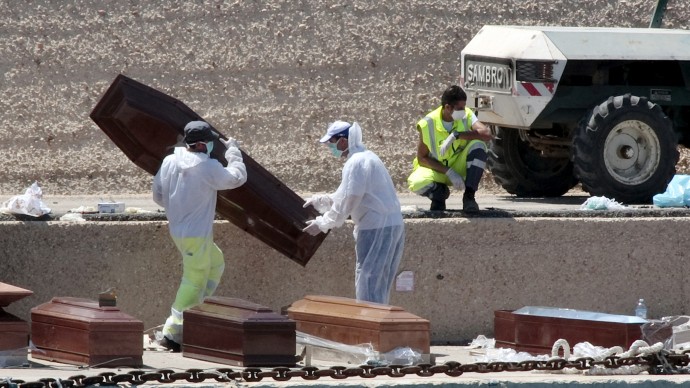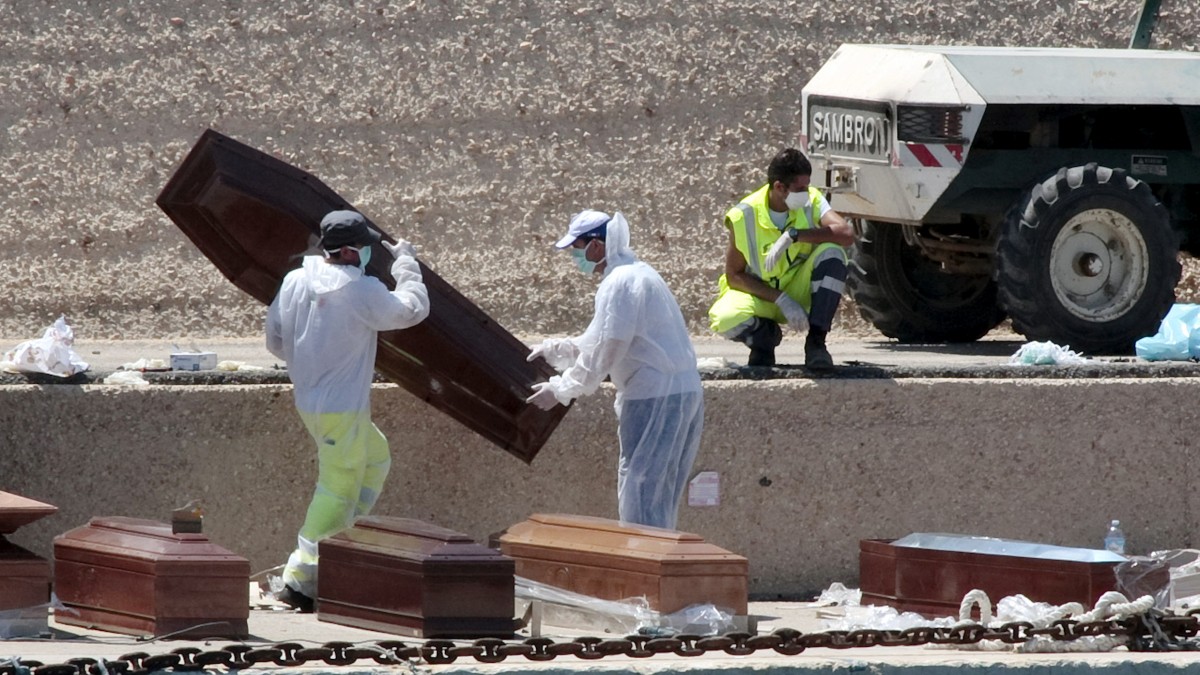
(MintPress)-The Parliamentary Assembly of the Council of Europe (PACE) adopted a report on Thursday, outlining a “catalogue of failures” that led to the deaths of 63 people fleeing Libyan conflict by sea last year, putting into context a broader range of issues regarding the failure of international bodies to communicate and take responsibility for search and rescue (SAR) activities in the Mediterranean.
On 26 March, 2011, a small boat left Tripoli for Europe with 72 passengers on board; 15 days later, the boat returned to Libya with only 10 passengers after drifting at sea for two weeks despite logged distress calls, which allowed the Italian Maritime Rescue Coordination Centre (MRCC) to pinpoint the boat’s location. Upon landing, the survivors were put in prison, where one additional passenger died.
Boat migrant deaths are not unique to the Mediterranean. As many as 1,500 people died attempting to cross the Mediterranean Sea in the first six months of 2011, making last year the deadliest on record for migrants in the Mediterranean.
In April, as many as 300 people are believed to have died when a boat carrying migrants from Libya to Europe capsized off the coast of Sicily. In August, 25 people were found dead among 296 passengers traveling to Lampedusa, a small Italian island that serves as a first point of entry for most migrants.
The case in question is uniquely important because the failures of various organizations to efficiently respond to distress calls from the passengers led to the deaths of 63 people on board.
Boat passengers first issued a distress alert by calling an Eritrean Priest living in Italy by satellite phone, who immediately informed the MRCC, which had the boat’s position plotted and sent a message to ships in the area to be on the lookout for the boat.“It was from this point that things went seriously wrong,” according to the report.
There were a number of alleged direct contacts between the boat in distress and other vessels, including a helicopter that dropped biscuits and water, but never returned, two fishing vessels, and a large military vessel which came into close contact with the boat and ignored obvious distress signals.
The report found a “vacuum of responsibility” due to a “collective failure” of all parties, including the Libyan authorities, Italian search and rescue authorities, flag states of naval vessels in the area, commercial ships, and NATO, which failed to react to distress calls despite having two military vessels in the region – one estimated to be just 11 miles from the boat.
Legalities of Maritime Search and Rescue
“Things went terribly wrong for the passengers…these people did not need to die,” said Tienke Strik, author of the report. Strik believes that “Those responsible have to be called to account and the incident needs to serve as a reminder that there are gaps in both law and practice concerning rescue at sea which need to be remedied.”
Under the 1982 UN Convention on the Law of the Sea, every coastal state and vessel are required to assist those in distress found at sea. Article 98 states that every ship flying its state’s flag, including commercial vessels, must “proceed with all possible speed to rescue persons in distress.” It also states that, “every coastal state shall promote the establishment, operation and maintenance of an adequate and effective search and rescue service…by way of mutual regional agreements…”
These obligations are complemented by the 1979 International Convention on Search and Rescue and the 1974 International Convention for the Safety of Life at Sea (SOLAS), which clarify that these duties should be fulfilled without regard to nationality, status, or circumstances of the persons in distress.
Although the boat was in Libya’s SAR zone, Strik affirms that “it is clear that there was nobody on the Libyan side capable of coordinating a search and rescue operation.” Therefore, it makes sense that Italy’s MRCC, first to receive the call, should have taken responsibility for the rescue operation.
Additionally, NATO-led Operation Unified Protector was underway, which promised to use all means necessary, short of invasion, to protect Libyan civilians. However, NATO did not utilize all of its means to rescue the boat migrants off the coast.
NATO Assistant Secretary General of Operations, Stephen Evans, said in a letter to Strik, that “In all cases, NATO warships did everything they could to respond to distress calls and provide help when necessary.”
“It is also worth noting that during the entire period of Operation Unified Protector, NATO maritime assets directly aided the rescue of over 600 migrants in distress at sea, including hundreds the day before the MRCC fax,” Evans added. “Commanders of warships under NATO command were, and remain, fully aware of their obligations under the International Law and Law of the Sea and responded appropriately”
Boats4People Flotilla Sails in Solidarity with Migrants
Even after a search and rescue mission is completed, there are still many safety concerns for migrants. Migrants face hardships receiving asylum and risk being sent back to the dangerous situations from which they fled. In Lampedusa, the migrant reception center has been shut down since a fire occurred last year.
Judith Sunderland, of Human Rights Watch, said “It is a depressing certainty that more people will die this year unless concerted action is taken to ensure rapid response to boats in distress, there is greater coordination among EU member states most responsible for search and rescue operations, we see more support from the rest of the EU, and more is done to ensure that commercial vessels take seriously their responsibility for rescue at sea and do not risk being criminalised for doing so.”
Boats4People, a group of 15 Euro-African associations, plans to launch a flotilla trip from Italy to Tunisia this Spring in order to raise awareness and urge EU accountability for the vast array of challenges facing boat migrants. The group calls for “a Mediterranean which is in solidarity with migrants and in opposition to repressive policies which seek to criminalise migration towards Europe more and more each day.”
The group of international organizations will lead the trip this Spring to pressure governments to denounce the tragedies taking place in the Mediterranean, hold border guards and NATO responsible for failing to assist vulnerable asylum seekers, and strengthen the coalition of Euro-African solidarity with regard to migrant rights.
Source: MintPress


